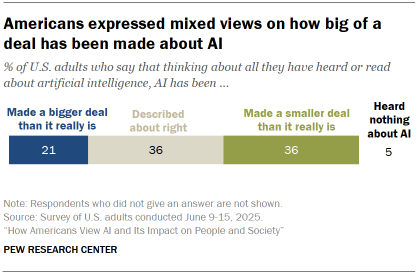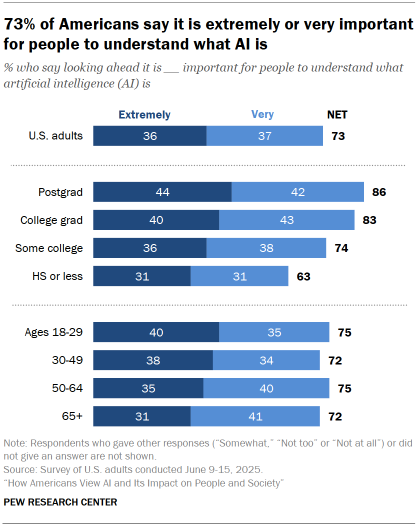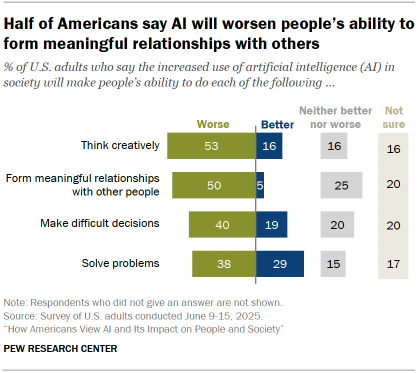Key findings
- Americans remain far more concerned (50%) than excited (10%) about the increased use of AI in daily life. Concern is up from 37% in 2021.
- More Americans, on balance, think AI will make people worse than better at key human abilities, such as thinking creatively or forming meaningful relationships with other people.
- Majorities do not want AI to play a role in deeply personal matters such as advising people about their faith in God or judging whether two people could fall in love.
- But many want AI to play at least a small role when it comes to making sense of large amounts of data in the scientific, financial and medical realms, including forecasting the weather, searching for financial crimes and developing medical treatments.

As artificial intelligence becomes more integrated into society, this chapter covers how Americans evaluate its potential impact. How do Americans feel about the use of AI in daily life? What potential impacts for society are Americans concerned about, and what are some areas where they see a role for AI?
Americans are more concerned than excited about the increased use of AI in daily life. Half of U.S. adults say the increased use of AI in daily life makes them feel more concerned than excited, compared with 10% who are more excited than concerned. About four-in-ten (38%) say they are equally excited and concerned.
The percentage who say they are more concerned than excited is now 13 percentage points higher than it was in 2021.
Americans across demographic groups are much more likely to be concerned than excited about AI in daily life. Refer to the Appendix for more detailed analysis.
How big of a deal is AI?
While Americans express concern about AI’s increased use in daily life, they have mixed views about whether these technologies are getting the attention they deserve.

- More Americans say AI has been made a smaller deal than it really is (36%) than say it’s been made a bigger deal (21%).
- Another 36% say it has been described as about right.
Refer to the Appendix for more detailed analysis.
How important do Americans think it is to understand AI?
To equip Americans to navigate the increasing presence of AI in the world, the federal government and educators have made calls to increase education about these technologies. And most Americans agree about the importance of AI literacy.

Nearly three-quarters of Americans say that looking ahead, it is extremely or very important for people to understand what AI is. One-fifth of U.S. adults say it is somewhat important that people understand AI, while few (6%) think this is not too or at all important.
Views by education
Americans with more education are more likely to think understanding AI is important: 86% of those with a postgraduate degree and 83% of those with a bachelor’s degree think this is extremely or very important. In contrast, 63% of those with a high school diploma or less education say this.
Views by age
Younger Americans are also somewhat more likely than older Americans to say it is extremely important for people to understand what AI is, but large majorities across all age groups think this is at least very important.
Concerns about AI’s impact on society
Overall, Americans are more concerned about people’s ability to do things on their own getting worse because of AI use than they are about potential missed opportunities of not using it.

About half of Americans (51%) say they are extremely or very concerned that people’s ability to do things on their own will get worse because of AI use. Another 31% are somewhat concerned about this.
Concerns that people will miss opportunities to improve their lives by being too reluctant to use AI are more muted, but still notable. About two-in-ten Americans (21%) express high concern about missed opportunities from reluctance to use AI, while 29% are somewhat concerned. The largest share (40%) say they are not too or not at all concerned about this.
Concerns about AI by age
Concern about people’s ability to do things getting worse because of AI use is somewhat higher among younger adults than older adults. Roughly six-in-ten adults under 30 (57%) say they are extremely or very concerned about this, compared with 46% of adults ages 65 and older.
Concerns about AI by race and ethnicity
White Americans (47%) in particular are not too or not at all concerned about people missing opportunities to improve their lives by being too reluctant to use AI, compared with Asian (30%), Hispanic (27%) and Black (26%) Americans.
The impact of AI on human abilities
AI simulates human behavior in many dimensions, and we asked Americans their predictions about the impact of this technology on fundamental human abilities, including thinking creatively, forming meaningful relationships, making difficult decisions and solving problems.

On the whole, relatively small shares of Americans have neutral or positive views about how the increased use of AI in society will affect creativity or connections:
- 16% say it will make people’s ability to think creatively better, while 53% say this would make it worse, and 16% say its impact on this ability will be neither better nor worse.
- Half say it will make people worse at forming meaningful relationships with others. Just 5% say AI will improve this ability, and 25% say AI will neither improve nor worsen this.
- Americans are about half as likely to say the increased use of AI in society will make people’s ability to make difficult decisions better (19%) as to say it will make it worse (40%), with 20% expressing a neutral opinion.
- Views on the impact of the increased use of AI to solve problems are more mixed but still tilt negative: 29% say the increased use of AI in society will make people’s ability to solve problems better, while 38% say it will make this worse.
Sizable shares of Americans – between 16% and 20% – say they are not sure about how AI may affect each of these human abilities.
Differences by age on views of AI’s impact on human abilities
Younger Americans are generally more likely than older Americans to think the increased use of AI will worsen human abilities. For example:
- 61% of adults under 30 think the increased use of AI in society will make people worse at thinking creatively, compared with 42% of those ages 65 and older.
- 58% of young adults say the increased use of AI in society will make people worse at forming meaningful relationships, compared with 40% of those ages 65 and older.
Older Americans are more likely to say they are not sure.
What role should AI have across society?

Majorities of Americans think AI should play a role in deep analytical tasks in scientific, financial and medical areas, such as forecasting the weather, searching for financial crimes, searching for fraud in government benefit claims and developing new medicines. At least three-in-ten Americans say AI should play a big role in these situations.
But Americans overwhelmingly reject AI’s involvement in more personal aspects of life. For example, 73% say AI should play no role at all in advising people about their faith in God. And 66% think AI should not have a role in judging whether two people could fall in love.
Americans also aren’t enthusiastic about AI playing a role in certain legal or government matters. For example:
- 47% say AI shouldn’t have a role in selecting who should serve on a jury, versus 33% who say AI should have a small or big role in this.
- 60% say AI shouldn’t have a role in making decisions about how to govern the country, while 27% support AI having a role.
There’s somewhat more openness to AI in the health care realm. Roughly two-thirds say AI should play at least a small role in developing new medicines. And 46% say this about AI providing mental health support to people.
Differences by education on the role of AI in life and society
When it comes to AI’s role in developing new medicines or predicting the weather, roughly half or more of Americans across education levels see at least a small AI role. But adults with higher education are much more receptive:
- Those with a postgraduate degree are far more likely than those with a high school diploma or less education to say AI should have a role in developing new medicines (85% vs. 52%).
- 88% of Americans with postgraduate degrees say AI should play a role in weather forecasts, compared with 62% of those with a high school diploma or less education.
But there’s agreement across education levels that AI doesn’t have a place judging whether two people will fall in love. Majorities of Americans of all education levels say AI should play no role in this.




